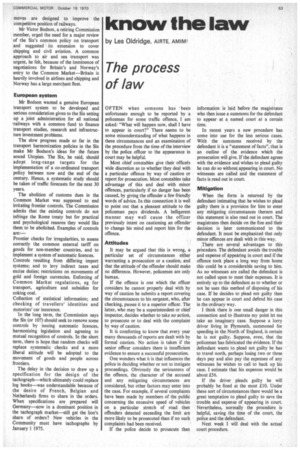know the law
Page 65

If you've noticed an error in this article please click here to report it so we can fix it.
by Les Oldridge, AIRTE, AMIM
The process of law
OFTEN when someone has been unfortunate enough to be reported by a policeman for some traffic offence, I am asked: "What will happen now, shall I have to appear in court?" There seems to be some misunderstanding of what happens in these circumstances and an examination of the procedure from the time of the interview by the police officer to the appearance in court may be helpful.
Most chief constables give their officers wide discretion as to whether they deal with a particular offence by way of caution or report for prosecution. Most constables take advantage of this and deal with minor offences, particularly if no danger has been caused, by giving the offender a few friendly words of advice. In this connection it is well to point out that a pleasant attitude to the policeman pays dividends. A belligerent manner may well cause the officer previously intent on cautioning an offender to change his mind and report him for the offence.
Attitudes It may be argued that this is wrong, a particular set of circumstances either warranting a prosecution or a caution, and that the attitude of the offender should make no difference. However, policemen are only human.
If the offence is one which the officer considers he cannot properly deal with by way of caution he submits a report covering the circumstances to his sergeant, who, after checking, passes it to a superior officer. The latter, who may be a superintendent or chief inspector, decides whether to take no action, to prosecute or to deal with the complaint by way of caution.
It is comforting to know that every year many thousands of reports are dealt with by formal caution. No action is taken if the senior officer considers there is insufficient evidence to ensure a successful prosecution.
One wonders what it is that influences the police in deciding whether or not to instigate proceedings. Obviously the seriousness or the offence, the character of the accused and any mitigating circumstances are considered. but other factors may enter into the case. For example, if several complaints have been made by members of the public concerning the excessive speed of vehicles on a particular stretch of road then offenders detected exceeding the limit are more likely to be prosecuted than if no such complaints had been received.
If the police decide to prosecute then information is laid before the magistrates who then issue a summons for the defendant to appear at a named court at a certain time.
In recent years a new procedure has come into use for the less serious cases. With the summons received by the defendant it is a "statement of facts", that is an outline of the evidence which the prosecution will give. If the defendant agrees with the evidence and wishes to plead guilty he can do so without appearing in court. No witnesses are called and the statement of facts is read out in court.
Mitigation When the form is returned by the defendant intimating that he wishes to plead guilty there is a provision for him to enter any mitigating circumstances thereon and this statement is also read out in court. The magistrates then decide on the fine and their decision is later communicated to the defendant. It must be emphasized that only minor offences are dealt with in this way.
There are several advantages to this procedure. The defendant avoids the trouble and expense of appearing in court and if the offence took place a long way from home this could be a considerable saving to him. As no witnesses are called the defendant is not called upon to meet their expenses. It is entirely up to the defendant as to whether or not he uses this method of disposing of his case. If he decides to plead not guilty then he can appear in court and defend his case in the ordinary way.
I think there is one small danger in this connection and to illustrate my point let me take an imaginary case. Suppose a lorry driver living in Plymouth, summoned for speeding in the North of England, is certain he is not guilty. Suppose, even, that the policeman has fabricated the evidence. If the defendant wants to plead not guilty he has to travel north, perhaps losing two or three days pay and also pay the expenses of any witnesses he wishes to call to back up his case. I estimate that his expenses would be about £56.
If the driver pleads guilty he will probably be fined at the most £10. Under these sort of circumstances there would be a great temptation to plead guilty to save the trouble and expense of appearing in court. Nevertheless, normally the procedure is helpful, saving the time of the court, the police and the defendant.
Next week I will deal with the actual court procedure.
























































































































